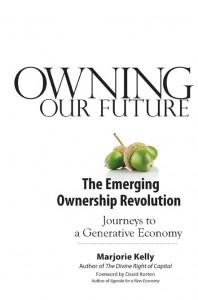Owning Our Future: The Emerging Ownership Revolution. Journeys to a Generative Economy.
Marjorie Kelly, Berrett-Koehler, Oackland, CA, USA, 2012

As long as businesses are set up to focus exclusively on maximizing financial income for the few, our economy will be locked into endless growth and widening inequality. But now people across the world are experimenting with new forms of ownership, which Kelly calls generative: aimed at creating the conditions for all of life to thrive for many generations to come. These designs may hold the key to the deep transformation our civilization needs.
To understand these emerging alternatives, Kelly reports from across the globe, visiting a community-owned wind facility in Massachusetts, a lobster cooperative in Maine, a multibillion-dollar employee-owned department-store chain in London, a foundation-owned pharmaceutical in Denmark, a farmer-owned dairy in Wisconsin, and other places where a hopeful new economy is being built. Along the way, she finds the five essential patterns of ownership design that make these models work.
As financial and ecological crises multiply and linger in our time, many people remain grim adherents of the TINA school of thought: There Is No Alternative to capitalism as we know it. Yet emerging alternative designs show that there is a real and workable alternative, which goes beyond the dusty 19th century categories of capitalism vs. socialism. It’s “yet to be recognized as a single phenomenon because it has yet to have a single name,” Kelly writes. “We might try calling this a family of generative ownership designs. Together they form the foundation for a generative economy” – an economy whose fundamental architecture tends to create beneficial rather than harmful outcomes. A living economy that has a built-in tendency to be socially fair and ecologically sustainable.
Kelly writes: “This is a book about deep change. It’s about hope. It’s about the real possibility that a fundamentally new kind of economy can be built, that this work is further along than we suppose, and that it does deeper than we would dare to dream. It’s about economic change that is fundamental and enduring: not greenwash or all the other false hopes flung in our faces for too long. The experiments I’m talking about are not silver bullets that will solve all our problems. They have flaws and limitations. But they nonetheless represent change that is fundamental and enduring because it involves ownership. That is to say, what’s at work is not the legislative or presidential whims of a particular hour, but a permanent shift in the underlying architecture of economic power.”
